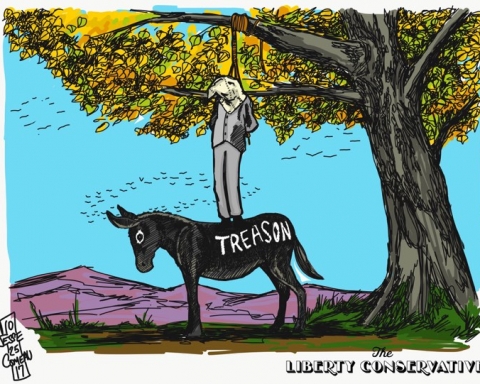George Orwell’s devastating satire on Stalinism, Animal Farm remains even 72 years later, along with Nineteen Eighty-Four, the gold standard for totalitarian literature.
But Orwell’s classic novel which established the phrase “Some Animals Are More Equal Than Others” nearly didn’t secure a publisher, who based their rejections not on the quality of the book, but because of its unwelcome politics.
Written and submitted during the height of Soviet popularity in 1943-1945, who, as a war-time ally pushed Hitler all the way back to Berlin, the fable was rejected not only by pro-Stalinists and at least one KGB agent, but by conservatives as well. Copies were even burned at one point in protest.
What made Orwell’s novel so verboten was the obviously intended purpose to expose the Soviet’s betrayal of socialism in a “story that could easily be understood by almost anyone and which could be translated into other languages.”
Through animal representations, Orwell showed how the highly-intelligent “pigs” headed by the Stalin animal “Napoleon” betrayed every tenet of the “constitution” fought for and established by the animals in their overthrow of their human exploiters.
The Stalin pig, flanked by the animal representations of the Soviet secret police, conducted his own version of the Purge Trials. Animal stand-ins masochistically confessed to the false accusations hurled at them by Napoleon, which was followed by their throats being ripped out by the dogs.
The novel ended with the pigs, who had garnered all power from the animals, cutting deals with their former human exploiters and eventually became identical to the humans in the eyes of the exploited animals.
Unlike a U.S publisher, who mistakenly identified the novel as akin to a Disney cartoon, publishers throughout the world all too well got the political message of Orwell’s novel and rejected it solely on that basis.
As part of his contract, Orwell submitted the manuscript to his long-time publisher Victor Gollancz, a fervent supporter of Stalin, warning him that the novel was “completely unacceptable from your point of view (it is anti-Stalin).” Gollancz, to his credit, resented Orwell’s assumption and wanted to read the book anyway. But true to form, Gollancz, four days after receiving it, proved Orwell’s assumption correct by concisely replying, “You were right and I was wrong.”
One publisher who expressed interest in the book was warned away from it by a Soviet mole named Peter Smollett, who worked in the Ministry of Information.
But the rejections did not come just from Stalinists. Revered conservative T.S. Eliot, who worked for Faber publications, rejected the book for being too left-wing. Calling the ideological thrust of the book “Trotskyite” (in point of fact Orwell believed that had exiled Bolshevik leader Leon Trotsky ruled over Russia, the regime would still have become totalitarian), Eliot nevertheless accepted the validity of the pigs ruling Animal Farm as they were the most “intelligent” of the animals, and argued that, “What was needed was not more communism but more public spirited pigs.”
Finally, Orwell was able to get a publisher from the small firm of Secker and Warburg, and the novel would go on to make the firm rich. But despite its resounding success in both England and America, with Orwell garnering praise from such intellectual heavy-weights as Edmund Wilson (even the British queen would obtain a copy), the novel was still endangered. A particular edition, intended for Ukrainian readers, was intercepted and either immediately burned or handed over to the Soviets by American forces in Germany.
But some copies nevertheless made it through to its intended readers. Those in Stalinist-dominated countries understood the satire of Stalin betraying the revolution and saw it as mirroring their own realities. In a letter written to Orwell by Ihor Szewczenko, a Ukrainian who worked on behalf of Soviet refugees, Szewczenko revealed the “striking” effect the novel had on them:
“They were profoundly affected by such scenes as the animals singing ‘Beasts of England…and their attention drawn on detecting the ‘concordances’ between the reality they lived in and the tale…the mood of the book seems to correspond with their own actual state of mind.”
Today, Animal Farm continues to enrich those publishers who keep it in print, but it is wise to remember that those in democratic countries once sought to deny it a publishing house, and–in the case of American military officials–burned the novel.










OK problem solved: https://www.youtube.com/watch?v=Q_r_z66yQoI